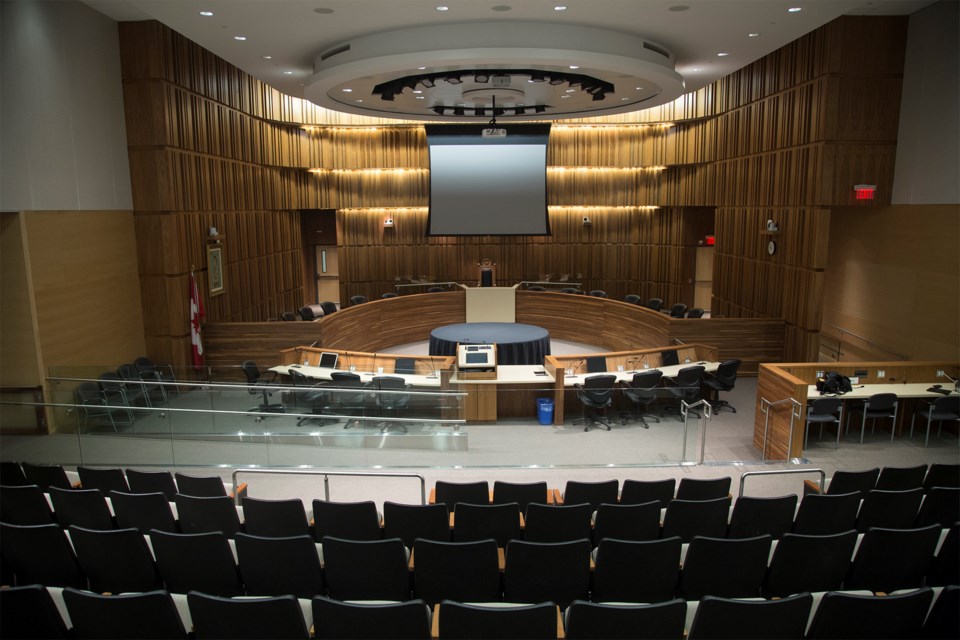If you were someone that publicly expressed their aggravation about the proposed 3.93 per cent City of Guelph budget increase for 2019, then you must be, at least, somewhat satisfied with Tuesday’s outcome of 2.69 per cent.
How did they do it? I saw at least one admittedly cynical person on Twitter suggest that staff proposed such a big hike so that when it came down by 1.3 per cent it would look like a heroic move of fiscal prudence by council. That’s not the case, but I know at the media table we were joking that the budget meeting would only last as long as it took us to get to 2.99 per cent.
The reality, of course, is that a staff memo of cost savings to the tune 0.44 per cent, and council’s decision to shave 0.65 per cent off the proposed increase to the dedicated infrastructure levy did most of the work. As did some borrowing from reserve accounts for new spending like initiatives coming out of the mayor’s task force on homelessness.
So it’s a good news story, right?
Well, for the most part, its selling it that way by the city. Mayor Cam Guthrie said in council after the vote, "It's pretty much, I think, one of the lowest budgets, minus the levy, almost ever."
Cool. But what does this budget cost?
The situation was summed up by councillor Leanne Piper when Councillor Dan Gibson proposed deferring half of the $600,000 that the city won’t be making from on-street parking downtown this year.
“We’ve already moved a whole lot ahead to next year,” Piper said.
What’s a “whole lot”? Well, we’re only paying half-a-year’s worth of salary for the 22 new positions approved in the budget, and the parking fee increases on the Norwich and Arthur Street lots will be phased in over two years.
The main sticking point though was that extra 0.65 per cent for the dedicated infrastructure levy. This stemmed from a council decision last year to fund half of the one per cent levy from reserve funds. Does anyone else sense a pattern?
“So we have a fully costed 10-year capital budget at $1.7 billion, and we’re worried about $11 million?” asked Gibson during the debate.
“We're talking about less than two per cent of our 10-year capital budget. If we just stay on track at one per cent, without any consideration of what might come from upper levels of government, I think we can give the taxpayers a break this time.”
“It was too easy in a lot of councils to pass that buck on to the next council,” said coun. James Gordon.
“I think we have to have a bigger philosophical discussion at some point,” he added. “I think the time has passed with this council, and in general, that the lowest budget is the best budget. I think the best budget is one that addresses our sustainability, equitability, and some of the special needs we’re addressing in this budget.”
Not all special needs were addressed in this budget though. Piper’s motion to increase the Community Wellbeing grant by $50,000 failed, as did a subsequent motion to increase it by $25,000.
Since the Community Wellbeing grants fund a lot of cultural groups and events, it’s hardly surprising that it became 26 out of 25 to use a baseball term, meaning just good enough to be the first person to miss the team cut-off.
Still, council seemed to approve $158,000 for the connection between the city’s trail network and the Rotary Club trail at Guelph Lake without blinking. Not that we want to pit trails against cultural groups, but if Wellbeing grant recipients want some attention in the next budget, then they might want to organize better, and maybe come to council with a specific ask.
And if Wellbeing grant recipients are going to take that advice, it will mean even more pressure on next year’s budget, which is already going to be a complicated affair because it will be the first time the city engages in multi-year budgeting.
There’s no question that this year’s budget, on its own, was a complicated affair. It was crammed in with about half-a-dozen top priorities after council took several months off because of the 2018 municipal election.
It’s come up a lot lately that council needs to take some time to sit down and hammer out a shared agenda. It might also make sense to take some time to hammer out how best to handle the ongoing challenge of the budget: too much demand, and not a lot of extra revenue to go around.
And while tremendous pains have been undertaken to make the budget process as smooth as humanly possible, it seems that there’s still some philosophical work that needs to be done, as Gordon alluded to. How does a growing city accommodate more demands for its resources with only so many ways to raise revenue? That should be a question at more than just “budget time.”
